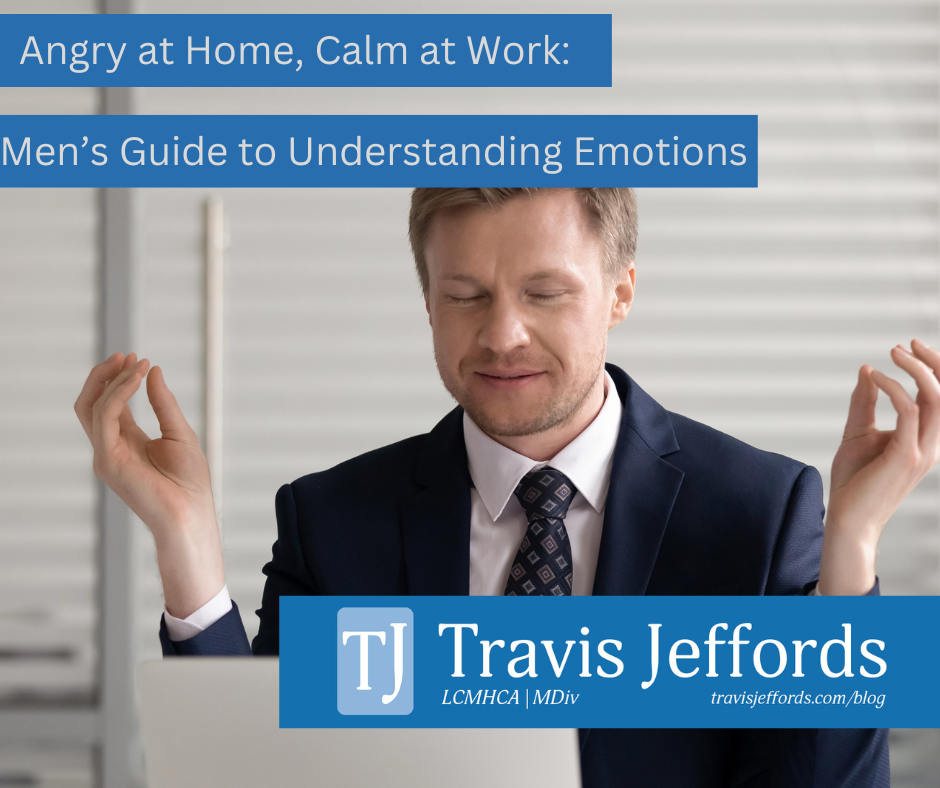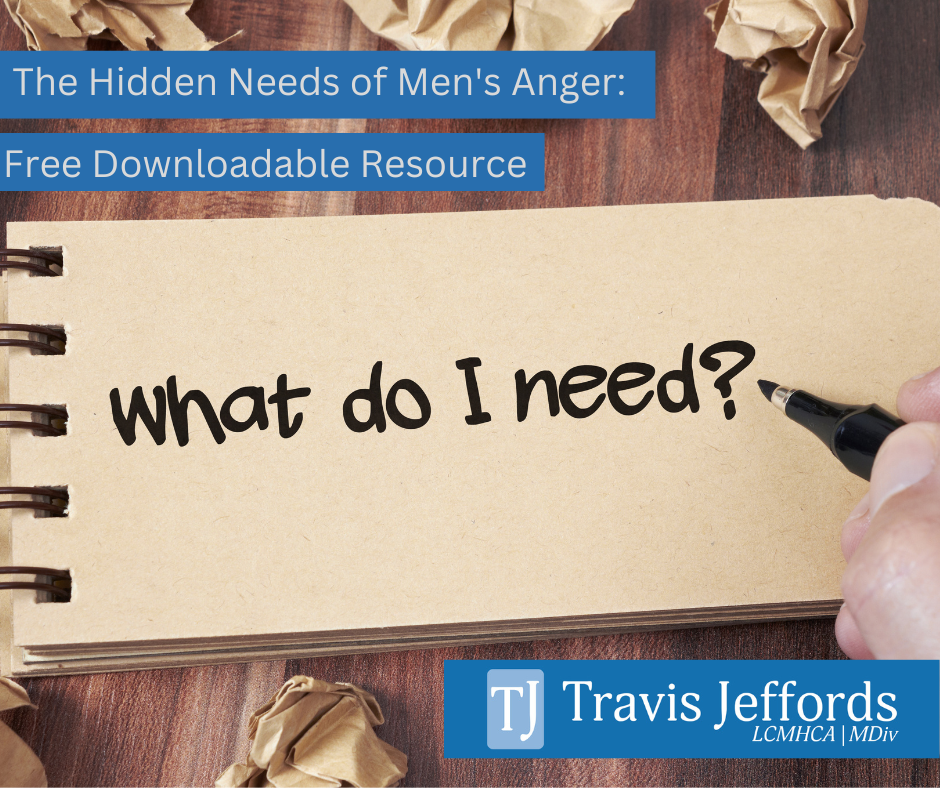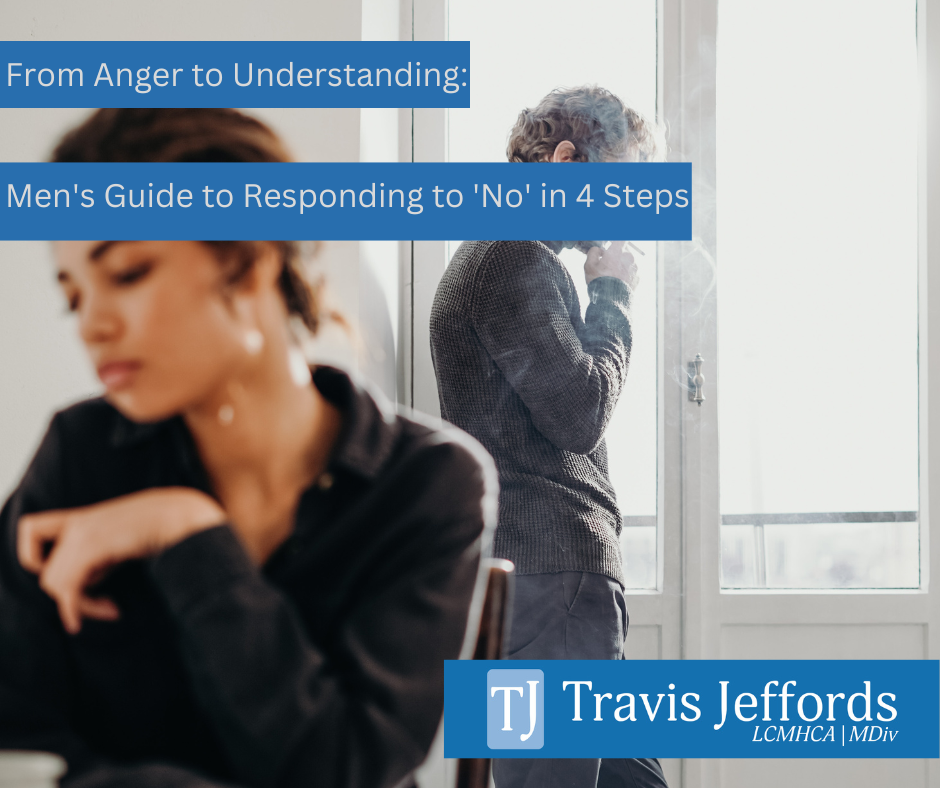From Anger to Understanding: Men's Guide to Responding to 'No’ in 4 Steps
It can be difficult to hear the word ‘no’.
I have a young daughter that has a part of her that will absolutely lose it at times when I use the word with her. And the truth is - many adult men have a very similar part inside us as well. (I know sometimes I do!)
Hearing ‘no’ can ignite a wave of intense emotions that men can struggle to deal with.
But there’s good news - it doesn’t have to be this way.
This blog will talk about what to do when you hear a ‘no’ that will actually move your relationship forward, and help you and your partner achieve results that you both want.
The Three Shifts That Reduce Anger at the Word ‘No’
If your blood starts boiling when you hear a ‘no’ from a partner - here are four internal shifts that you’ll want to work towards in order to break out of the cycle of anger, and more towards understanding and a solution that works for both you and your partner:
Engaging Your Anger with Curiosity
When our angry part seems to ‘take us over’ when someone says ‘no’ to us, we can easily react in ways that we may later regret, or that do not help resolve the conflict. The word Richard Schwartz, founder of Internal Family Systems, uses to describe a part (like anger) taking over is ‘Blended’.
Oftentimes men are frustrated and critical of their angry part for becoming blended with them, and so they do everything in their power to push down and control and suppress their angry part. But trying to force an angry part to remain quiet can be like trying to hold a beach ball under water…you might be able to do it for a few minutes, but the further you push it down, when you do eventually lose your grip on it - it’s going to fly up out of the water with pent-up, stored energy.
What actually helps reduce our anger is, paradoxically, when we are able to get curious about it, connect with it, and discover what it is trying to tell you and how it is trying to help you in that moment. My core belief, is that all our emotions and internal parts are doing their best to help us…we just might not understand how or why they are helping us this way right now.
Here are some questions you can ask your angry part with a sense of Curiosity when it starts to get upset that someone has told you ‘no’:
What does the angry part want you to know?
What is it worried would happen if it wasn’t angry right now?
Are there other emotions/parts that the angry part is trying to protect right now by feeling angry? (sadness, anxiety, grief, shame, etc.)
Are there any boundaries inside of you that the angry part is trying to alert you have been crossed?
Finding an internal sense of Curiosity when you ask your angry part these questions is absolutely essential. If you try to understand your angry part but interact with it from a place of frustration - the part is not going to open up to you in the same way as if you are able to find a sense of Curiosity within you.
2. Getting Clear on what You Need
After you understand your anger more because you have engaged with a sense of Curiosity, it’s time to sort through exactly what it is that you need from your interaction with your partner. You will probably find that your core need is actually not the same request that you originally had.
If, for example, you asked your partner for sex and they said ‘no’ and you felt angry, it would be easy to think that your need is simply to have sex with your partner. But - the lack of sex likely speaks to a deeper need that is not being addressed. If you extend a sense of Curiosity to your angry part, you may find that a denial of a sexual request is provoking anger because you have one of the following needs that aren’t being fulfilled:
The need to feel valued by your partner
The need to feel secure in your relationship
The need to feel desired by others
It could be one of the above, it could be any number of other needs that aren’t being heard, but once you really understand what your anger is trying to tell you, and the need that it is alerting you to, a couple things will happen:
Your anger will likely decrease because it will feel understood.
You’ll be able to share what is happening within you in a way that your partner is more likely to connect with and less likely to upset them.
So - instead of becoming blended with your angry part and saying something like ‘you never want to have sex! If you don’t take care of my needs, I’ll find someone who will!’, which will just result in more frustration for both of you, you could find yourself saying something like the following after you understand your angry part better:
“I’m actually feeling distant from you and anxious about our relationship right now. I have a need to feel more secure in our relationship, and physical intimacy is one of the things that has met that need in the past”.
That second statement has a much higher likelihood of being received with openness from your partner than the first, right? And you can do this with all kinds of relationships and situations.
But there’s more:
3. Getting Curious about your Partner’s Needs.
Just like I have the core belief that your anger is trying to help you in a way that doesn’t make sense to you yet and that you may not understand at this moment - I have another core believe that when people say ‘no’, they do so because they are trying to get their own core needs met.
Many of us have been taught that when someone says ‘no’ to us we should respond with blame. But - this just leaves both people frustrated and at a stand still. If you can find that same Curiosity within you that you used to get to know your own angry part, you will uncover needs the person who gave you a ‘no’ is trying to meet.
When we shift to trying to uncover their needs, it totally changes the tone of the conversation we’re having. Instead of blaming or accusing or judging or interpreting…all things that will create frustration and more anger, we get Curious.
For example, here are some possible needs a partner may be speaking from when they deny someone sex, that actually have very little to do with sex or sexual interest:
The need to feel close to you emotionally, which is not currently being met.
The need to find rest, which is not currently being met by their frantic life or family needs
The need to feel desirable, which your partner may not feel currently.
The need for spontaneity, which is not currently being met.
Knowing the needs our partner has when they say ‘no’ is huge. As Marshall Rosenberg writes in his book Nonviolent Communication,
“If we can hear the need behind a “no,” we can continue the…process, maintaining our focus on finding a way to meet everybody’s needs - even if the other party says “no” to the particular strategy we presented them”.
Rosenberg, p. 175
If you can listen with Curiosity and help your partner uncover their own need that they are speaking from. You are very close to a breakthrough.
4. Trusting that there is a solution when everyone’s needs are considered.
When everyone is clear about each other's needs and curious about meeting them, then a solution really can be found. When we both stay open and really desire what is best for everyone, you don’t have to settle for a win-lose kind of compromise, but really can find solutions that speak to and satisfy both people’s previously unstated core-needs.
This is possible because when you realize the core needs you are operating from, the number of options to meet those core needs really widens. If we’re just trying to meet the original stated needs, then we may be at a standstill:
For example, if one person’s stated need is to have sex, and the other person’s stated need is to not have sex…it leaves us with very little room.
BUT - when we understand that one person has a core need to feel close to their partner again, and the other partner has a core need for rest, we can get creative about solutions to meet both people’s needs.
Next Steps…
Navigating emotions and handling anger can be hard for men, and often impacts their mental health and overall well-being. But it doesn’t have to be this way. By incorporating these principles and equipping yourselves with essential coping skills, you can not just manage your emotions…but actually understand the deep need that your anger is trying to tell you about, paving the way for healthier interactions and personal growth.
Understanding our own feelings and needs from a place of curiosity becomes paramount in our journey towards emotional well-being. By exploring our inner landscape, we gain insight into the underlying motivations behind our emotional responses. This self-awareness enables us to identify the root causes of our anger. Through this process, we can start to address and nurture our mental health, taking crucial steps towards finding balance and emotional resilience.
In order to further support men in their journey of emotional well-being, I am excited to offer a free video resource titled "The 5 Coping Skills Every Man Needs to Know." This video provides practical techniques and strategies to help men effectively manage their emotions and reduce anger. By incorporating these coping skills into daily life, men can develop the ability to regulate their emotions, find their state of curiosity, and move forward in a more empowered and balanced manner.
So, the next time you encounter a 'no,' remember to pause, take a breath, and approach the situation with Curiosity. Seek to understand your own feelings and needs while extending that understanding to your partner. And to further support your journey, don't forget to access the free video resource, "The 5 Coping Skills Every Man Needs to Know," which will equip you with valuable tools to manage your emotions and cultivate a state of curiosity needed for personal growth and emotional well-being.
Wishing you the best on your mental health journey.
Hi, I’m Travis.
My clients describe me as calm, compassionate, and curious…
You have these qualities inside you at your core too. You just need a little help uncovering them.
If you’re dominated by anger, anxiety, shame, or self-criticism, we can help you re-connect with who you really are: confident, calm, courageous, compassionate, and connected to yourself and others.
Travis Jeffords - LCMHCA | MDiv. | Male Counselor
In-person counselor: Greensboro & Winston-Salem
Virtual counselor: North Carolina
Licensed Counselor
















